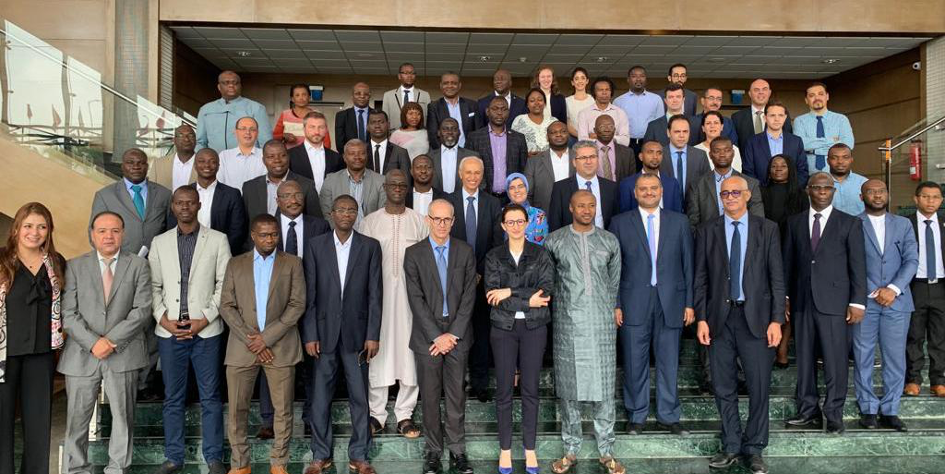WORKSHOP

WORKSHOP
22 - 23 July 2019
Contexte général
The year 2020 will mark the beginning of the first cycle of the Nationally Determined Contributions (NDC). The NDC implementation period runs for five (5) or ten (10) years depending on the time horizon defined by countries in their submission. The actions and measures identified in the NDC are expected to start delivering outcomes to ensure countries achieve the targets and ambitions set in their NDC by the end of the implementation period. Showing leadership and ambition for climate actions, all 54 countries have signed the Paris Agreement and submitted ambitious conditional and unconditional Intended Nationally Determined Contributions (INDCs). More than fifty (50) countries have ratified ambitious NDCs, with investment requirements above US$ 2.5 trillion, it is crucial that African countries are fully engaged with the implementation of their NDCs and secured significant and adequate support withmeans of implementation. The total cost of adaptation estimated for all African countries is US$7.4 billion a year consistent with the range of US$7-15 billion a year estimated by the UNEP Adaptation Gap Report.Since the submissions of their NDC in 2014, African countries have undertaken several steps to advance the implementation of their communicated NDC by:
 undertaking consultations on the implementation of NDC;
undertaking consultations on the implementation of NDC;
 refining or updating the analysis underpinning the NDC;
refining or updating the analysis underpinning the NDC;
 developing NDC implementation or investment plans that prioritize specific sectorial or cross sectorial climate actions;
developing NDC implementation or investment plans that prioritize specific sectorial or cross sectorial climate actions;
 aligning their NDC actions with their countries policy priorities;
aligning their NDC actions with their countries policy priorities;
 designing institutional arrangements and coordination mechanisms to support NDC implementation ;
designing institutional arrangements and coordination mechanisms to support NDC implementation ;
 improving the regulatory and institutionalframework;
improving the regulatory and institutionalframework;
 identifying and prioritizing policies and measures;
identifying and prioritizing policies and measures;
 assessing how to attract or reorient investments toward climate actions and, designing monitoring systems to measure progress toward NDC goals etc.
assessing how to attract or reorient investments toward climate actions and, designing monitoring systems to measure progress toward NDC goals etc.
These steps are important. They are necessary pre-conditions and enablers of effective actions that need to be implemented for delivery of the targets associated to NDC. However there is need to better understand how much has been actually delivered towards effective implementation of the NDC of African countries. Expectations on all countries to meet the level of ambition associated to the Paris Agreement are immense. While they are progressing towards the implementation of their first NDC, countries must also submit in 2020 the NDC of the second cycle, as well as their long-term low emission strategies in accordance with Paris Agreement Article 4:19 and Decision 1/CP.21 par. 35.
The current and projected adverse effects of climate change pose a real challenge for Africa, these adverse effects have proven to be detrimental for the continents economy, its people and its resources. Several leaders have expressed the need for climate action to become a high priority in the development agenda of all African States, but the challenges of addressing such multidimensional and conflicting imperatives remains important.
Le premier Dialogue sur la mise en œuvre des CDN africains sera l'occasion de faire le point sur la mise en œuvre effective des CDN dans les pays africains. Et de comprendre où en sont les pays dans leur cheminement vers la réalisation des objectifs et des ambitions associés à leurs CDN. L'accent mis sur le secteur agricole aidera les pays à élaborer une stratégie pour faire progresser la mise en œuvre des priorités identifiées dans ce secteur.
Objectives
 Take stock of the progress on the implementation of African countries NDC, with a focus on targets related to the agriculture sector.
Take stock of the progress on the implementation of African countries NDC, with a focus on targets related to the agriculture sector.
 Share experiences on initiatives and actions by AAA, AAI and members states to advance country agenda on low emissions, climate resilient and sustainable agriculture.
Share experiences on initiatives and actions by AAA, AAI and members states to advance country agenda on low emissions, climate resilient and sustainable agriculture.
 Explore avenues to maximize existing financing opportunities, including the Green Climate Fund to leverage resources at scale for a sustainable agriculture underclimate change in Africa.
Explore avenues to maximize existing financing opportunities, including the Green Climate Fund to leverage resources at scale for a sustainable agriculture underclimate change in Africa.
 Identify the need of support for effective and strategic approaches to address the challenges of Adaptation of the Agriculture in Africa.
Identify the need of support for effective and strategic approaches to address the challenges of Adaptation of the Agriculture in Africa.
 To promote the exchange of experience and expertise and establish a collaborative framework between member states for the sharing of information and experiences on the implementation of the NDCs in support of Adaptation of the Agricultural sector
To promote the exchange of experience and expertise and establish a collaborative framework between member states for the sharing of information and experiences on the implementation of the NDCs in support of Adaptation of the Agricultural sector
Expected outcomes
At the end of the dialogue, it is expected that participants have learnt from AAA, AAI, experts and other countries, developed strategic directions to support the progress of the implementation of their NDC, gained a better understanding of other African countries’ experiences and developed a common Africa strategy to support Africa in the implementation of the targets for the Agricultural sector.

Proceedings: The dialogue isorganized as a 2-day event.
Audience :
- 2 representatives per country,
- representative each of the GCF,
- national designated authority and the Ministry in charge of Agriculture, AAI and AAA experts and partners.
